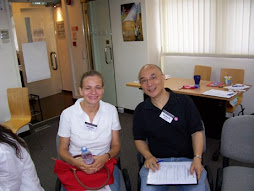As preparation is a vital key to confidence and a smooth delivery of your presentation, be sure to schedule plenty of time for your thinking and planning process. It also helps to think of the worst that can happen. This will actually give you the boost you need knowing that whatever happens, you will be able to handle it.
Here are my Top 5 Presentation Disasters (and they are all from direct experience!) and how you can avoid them.
1. Audience not responding, falling asleep or distracted (on mobile phones or blackberries): The easy way to have your audience on alert is to schedule your presentation (if possible) in the morning when people tend to be more fresh and awake. After lunch is the worst time, especially if you are showing PowerPoint in a dark room.
Announce at the opening that all phones and blackberries are to be turned off to ensure the presentation runs smoothly and on time.
To keep participants engaged, create interaction and ask questions to solicit a simple yes or no answer to keep them involved. One of my favorite techniques is to pair up or organize small group discussions so that they not just sitting and listening the entire duration of your presentation.
The average attention span is 10 minutes and you will have to handle this with different styles and engagement to maintain the audience's attention.
2. Forgetting your lines or mind going completely blank. This seems to be the biggest fear among our clients and you must realize that the more you think and worry about this, the more likely it may actually happen! The real secret to avoiding this is to prepare and prepare well. We always recommend clients to prepare with an outline of their presentation, rather than an entire speech and you can write out the key points on index cards.
NEVER memorize a speech word for word. That is exactly how someone may go blank. If you forget a line, then you will be frozen as you try to recall from memory the exact line you have missed and you are unable to continue as the line precedes the next line.
If you do forget, it is TOTALLY ACCEPTABLE to step back, take a sip of water and refer to your index cards.
Another way to handle this awkward moment is to immediately take a deep breath. It will help clear your mind and get back on track. If you panic and start racing to remember, the moment will feel like an eternity, an agonizing eternity. Taking a deep breath will send oxygen to your brain and help you focus.
3. An audience member interrupts your presentation to openly challenges your content. To avoid this from happening is to firstly know what you are talking about. If you know your subject inside out, you will be able to respond confidently. If you are not the world's #1 expert on your topic, then study very hard and prepare, prepare, prepare! Also you must believe in your content, that is, you must first "buy-in" to what you are saying. Otherwise, how do you expect others to?
Realize that someone who makes a public remark and challenges a speaker on stage is looking for attention and significance. The last thing to do is to defend yourself or challenge him/her back. Give the person some respect and the attention they seek and then move on.
A way to respond may be: "Thank you for bringing that up. We have not fully researched the findings so you are right about XXX..." and then offer to follow up.
As part of your preparation process, have a think about what challenging questions may come from the toughest skeptics and plan your answers accordingly. Put yourself in the shoes of a most apathetic participant and poke at the holes in your presentation. You may either change your content or study up some more on your subject!
4. Audience members walking out or showing clear disapproval. This tends to be a number one distractor for presenters and they are likely to react or feel they have to work harder to keep the rest of the audience interested. Remember that you will never please everyone.
They may have things going on in their life and you will never know what's happening behind the scenes to cause the distraction or for them to walk out. If you had prepared your content to meet your audience's needs, the likelihood of this happening will be greatly reduced as you are providing relevant value.
The key tip to handling this is to carry on and focus on the message of your presentation, the value of your content and remember that you are speaking to contribute to the audience. Get over yourself and focus on their needs!
5. PowerPoint or audio/visual equipment not working. This happens to every presenter at one time or another, myself included just recently. First rule if you are using AV equipment is to GO EARLY TO SET UP!
Test out your PowerPoint, check that your battery is fresh in your clicker, microphone and other visual aids. Back up your presentation on a memory stick in case your laptop is not compatible with the projector.
Another way to avoid this from happening is to scrap the PowerPoint altogether!
As for my recent mishap with a laptop refusing to cooperate and consistently crashing even though I tested it before the presentation; I pushed the whole thing aside and moved on to the next portion of my presentation while a colleague helped to sort it out.
In summary, preparation is key but sometimes the unexpected will happen. Remember that you will survive and live on. The final tip is to be focused and prepare for every presentation like it's the most important presentation of your life and stay audience focused.
We have more presentation tips and articles on this website. Please continue to scroll down for more resource materials.
Subscribe to:
Post Comments (Atom)

























































































































































































































































No comments:
Post a Comment